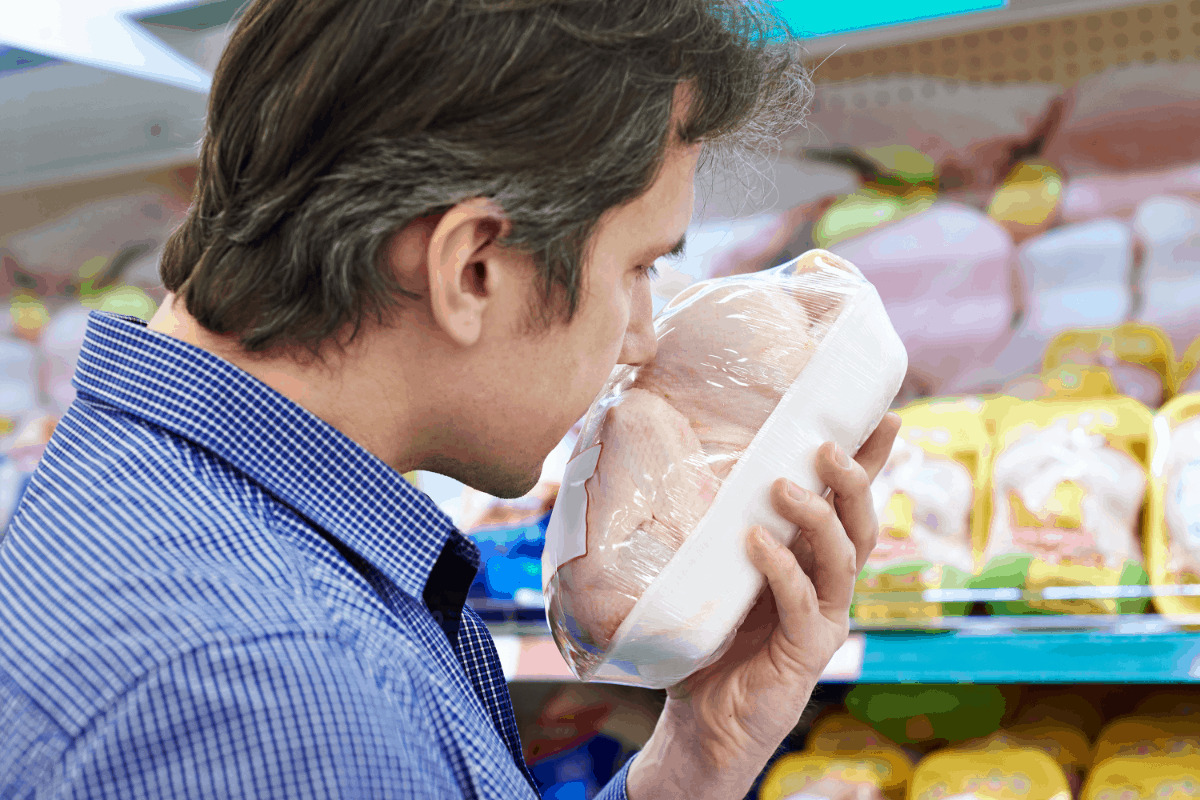

FAQs
Why Does My Dog Fart A Lot
Modified: August 26, 2023
Discover the answers to common questions about why your dog farts frequently. Find out the possible causes and how to manage excessive flatulence in canines.
(Many of the links in this article redirect to a specific reviewed product. Your purchase of these products through affiliate links helps to generate commission for Under-tec.com, at no extra cost. Learn more)
Table of Contents
Introduction
As a dog owner, you may have experienced the unpleasant odor and sound of your furry friend passing gas. It’s not uncommon for dogs to fart, but excessive flatulence can become a cause for concern. If you find yourself wondering, “Why does my dog fart so much?” you’re not alone.
Flatulence, or the passing of gas, is a natural bodily function for both humans and animals. It occurs when excess gas accumulates in the digestive system and needs to be released. While occasional farting is normal, excessive flatulence in dogs can be a sign of an underlying issue.
In this article, we will explore the various causes of excessive flatulence in dogs and discuss ways to manage and reduce it. Understanding the potential reasons behind your dog’s frequent gas can help you address the problem and improve your pet’s overall well-being.
It’s important to note that while excessive flatulence can be a nuisance, it is typically not a serious medical concern. However, if you notice other symptoms alongside the increased gas, such as bloating, diarrhea, vomiting, or changes in appetite or behavior, it may be a sign of an underlying health issue. In such cases, it is best to consult with your veterinarian for a proper diagnosis and treatment plan.
Now, let’s dive into the common causes of excessive flatulence in dogs and explore strategies to help alleviate this gassy situation.
Causes of Excessive Flatulence in Dogs
While occasional flatulence is a normal bodily function for dogs, excessive gas can be a sign of an underlying issue. There are several factors that can contribute to increased flatulence in our canine companions. Let’s take a closer look at some of the common causes:
- Dietary Factors: One of the primary culprits for excessive flatulence in dogs is their diet. Certain foods, particularly those high in fiber or difficult to digest, can lead to increased gas production. Foods such as beans, peas, broccoli, cabbage, and dairy products are known to cause flatulence in dogs. Additionally, feeding your dog table scraps or a diet consisting of low-quality ingredients can also contribute to excessive gas production.
- Food Intolerances and Sensitivities: Just like humans, some dogs may have food intolerances or sensitivities that can cause excessive flatulence. Common culprits include grains, gluten, certain proteins (like beef or chicken), and additives such as artificial colors or preservatives. If your dog experiences flatulence after consuming certain foods, it may be worth considering a specialized diet or working with a veterinarian to identify potential food allergies.
- Poor Digestion and Gut Health: Dogs with poor digestion or imbalances in their gut flora may experience increased gas production. When the food is not properly broken down in the stomach and intestines, it can ferment, leading to the release of gas. Factors such as rapid eating, eating too much at once, or a lack of digestive enzymes can contribute to poor digestion and flatulence.
- Swallowing Air: Another common cause of excessive flatulence in dogs is the ingestion of air, also known as aerophagia. This can happen when dogs eat or drink too quickly, chew on toys or bones vigorously, or when they have respiratory issues that cause them to swallow more air. The swallowed air can accumulate in the digestive system, leading to increased gas production.
- Medical Conditions: In some cases, excessive flatulence can be a symptom of an underlying medical condition. Conditions such as gastrointestinal infections, pancreatitis, inflammatory bowel disease, intestinal parasites, or intestinal obstructions can all contribute to increased gas production. If your dog is experiencing other symptoms alongside the excessive flatulence, it is essential to consult with a veterinarian for a proper diagnosis and treatment plan.
Understanding these possible causes can help you identify the source of your dog’s excessive flatulence. In the next section, we will discuss various remedies and management strategies to help reduce and alleviate gas in dogs.
Dietary Factors
The food your dog consumes plays a significant role in their digestive health and can greatly impact their flatulence levels. Understanding which dietary factors contribute to excessive gas production can help you make informed choices when it comes to your dog’s diet.
Here are a few dietary factors that can contribute to increased flatulence in dogs:
- High-Fiber Foods: Dog foods that are high in fiber, such as those containing ingredients like beans, peas, or lentils, can lead to increased gas production. While fiber is generally beneficial for dogs’ overall digestion, excessive amounts can cause bloating and flatulence. If your dog is prone to gas, consider selecting a dog food with a moderate amount of fiber.
- Difficult-to-Digest Ingredients: Some ingredients are more challenging for dogs to digest, leading to increased gas production. For example, cruciferous vegetables like broccoli, cauliflower, and cabbage can cause gas in dogs. Dairy products, due to lactose intolerance, can also be a common culprit. Consider avoiding these ingredients or minimizing their consumption if your dog experiences excessive flatulence.
- Table Scraps and Low-Quality Foods: Feeding your dog table scraps or a diet consisting of low-quality food can contribute to increased flatulence. Human foods are not always suitable for dogs and can disrupt their digestive system, leading to gas. Additionally, low-quality dog foods may contain fillers and artificial additives that can cause digestive issues. Opt for high-quality, balanced dog foods to promote better digestion and reduce flatulence.
- Food Transition: Abruptly changing your dog’s diet or introducing new foods too quickly can cause digestive disturbances and flatulence. When transitioning to a new food, do it gradually over a period of 7-10 days by mixing increasing amounts of the new food with the old one. This allows your dog’s digestive system to adjust and can help minimize gas production.
Monitoring your dog’s diet and identifying specific ingredients or types of food that trigger excessive flatulence can help you make necessary adjustments. Additionally, consulting with a veterinarian or a veterinary nutritionist can provide valuable guidance in selecting an appropriate diet for your dog’s specific needs.
In the next section, we will explore other potential causes of excessive flatulence in dogs, such as food intolerances and sensitivities.
Food Intolerances and Sensitivities
Food intolerances and sensitivities can contribute to excessive flatulence in dogs. Just like humans, certain ingredients or types of food can cause digestive disturbances and gas in ourli>Elimination Diet: If you suspect that your dog’s flatulence is caused by a food intolerance or sensitivity, your veterinarian may suggest conducting an elimination diet. This involves feeding your dog a limited ingredient diet consisting of novel protein and carbohydrate sources, such as venison and sweet potato, for a period of several weeks. Slowly reintroducing eliminated ingredients one by one can help identify which specific ingredient is triggering the flatulence.
Remember that every dog is unique, and what triggers excessive flatulence in one dog may not affect another. It’s crucial to pay attention to your dog’s individual response to different foods and make appropriate dietary adjustments as needed.
In the following section, we will discuss the importance of proper digestion and gut health in managing excessive flatulence in dogs.
Poor Digestion and Gut Health
Poor digestion and imbalances in gut health can contribute to increased flatulence in dogs. When the food your dog eats is not properly digested and absorbed, it can lead to excessive gas production and discomfort. Here are some factors that can contribute to poor digestion and imbalances in gut health:
- Rapid Eating: If your dog tends to gulp down their food quickly, they may be swallowing air along with their meals. This can contribute to bloating and increased gas production. Consider slowing down your dog’s eating by using puzzle feeders, slow-feed bowls, or dividing their meals into smaller portions throughout the day.
- Overeating: Feeding your dog large meals or allowing them to consume excessive amounts of food in one sitting can overwhelm their digestive system. This can lead to poor digestion and increased fermentation in the gut, causing flatulence. Dividing your dog’s meals into smaller, more frequent feedings can help improve digestion and reduce gas production.
- Lack of Digestive Enzymes: Digestive enzymes play a critical role in breaking down food and aiding in digestion. Some dogs may have a deficiency in certain digestive enzymes, which can impair their ability to properly digest food and lead to increased gas production. Adding digestive enzyme supplements to your dog’s meals can help improve digestion and reduce flatulence.
- Imbalances in Gut Flora: The gut is home to a complex ecosystem of microorganisms that play a crucial role in digestion and overall health. If there is an imbalance in the gut flora (known as dysbiosis), it can negatively impact digestion and contribute to flatulence. Probiotics are beneficial bacteria that can help restore the balance of gut flora and promote better digestion. Consult with your veterinarian to determine the appropriate probiotic supplement for your dog.
Addressing poor digestion and promoting a healthy gut can help alleviate excessive flatulence in dogs. By implementing feeding strategies to slow down eating, prevent overeating, and incorporating digestive enzyme supplements and probiotics, you can support your dog’s digestion and minimize gas production.
In the next section, we will explore another common cause of excessive flatulence in dogs: swallowing air.
Swallowing Air
Swallowing air, known as aerophagia, is another common cause of excessive flatulence in dogs. When dogs gulp down their food or water quickly, chew on toys or bones vigorously, or have certain respiratory issues, they may unintentionally swallow air along with these activities. This swallowed air can accumulate in the digestive system, leading to increased gas production and flatulence.
Here are a few factors that can contribute to your dog swallowing air:
- Rapid Eating and Drinking: Dogs that eat or drink too quickly are more likely to swallow air. This is especially common in dogs who are eager eaters or have food aggression. Consider using a slow-feed bowl or puzzle feeder to slow down your dog’s eating pace. For drinking, use a bowl with a narrow opening or consider using a water dispenser that slows down water flow.
- Chewing Behaviors: Dogs that chew on toys, bones, or other objects fervently may inadvertently swallow air in the process. While chewing is a natural behavior for dogs, monitor their chewing habits and provide appropriate and safe chew toys to minimize excessive swallowing of air.
- Respiratory Issues: Dogs with certain respiratory conditions, such as brachycephalic breeds (e.g., Bulldogs, Pugs) or those with nasal congestion, may swallow more air due to difficulty breathing through their noses. If your dog has respiratory issues, consult with your veterinarian for proper management strategies.
To reduce your dog’s air swallowing and subsequent flatulence, try the following:
- Slow Down Feeding: Use a slow-feed bowl or divide your dog’s meals into smaller portions to encourage slower eating and minimize air intake.
- Supervise Chewing: Monitor your dog’s chewing activities and provide appropriate chew toys that do not promote excessive air intake.
- Address Respiratory Issues: Work with your veterinarian to manage any respiratory conditions your dog may have to alleviate excess air swallowing.
By addressing the underlying causes of air swallowing, you can help reduce flatulence in your dog and promote their overall comfort and well-being.
In the following section, we will explore potential medical conditions that can contribute to excessive flatulence in dogs.
Medical Conditions
In some cases, excessive flatulence in dogs can be a symptom of an underlying medical condition. It’s important to be aware of these potential conditions and consult with a veterinarian for an accurate diagnosis and appropriate treatment. Here are some medical conditions that can contribute to increased gas production in dogs:
- Gastrointestinal Infections: Infections caused by bacteria, viruses, or parasites can disrupt the normal digestive process, leading to excessive flatulence. Common signs of gastrointestinal infections include diarrhea, vomiting, loss of appetite, and lethargy.
- Pancreatitis: Pancreatitis is inflammation of the pancreas, a gland responsible for producing digestive enzymes. If the pancreas becomes inflamed, it can impact digestion and result in increased gas production. Dogs with pancreatitis may also exhibit symptoms such as abdominal pain, vomiting, and loss of appetite.
- Inflammatory Bowel Disease (IBD): IBD is characterized by chronic inflammation of the gastrointestinal tract. This condition can disrupt the normal digestive process and cause flatulence. Other symptoms of IBD in dogs include diarrhea, vomiting, weight loss, and a decreased appetite.
- Intestinal Parasites: Parasites such as worms (e.g., roundworms, hookworms) can irritate the intestinal lining and cause digestive disturbances, including excessive flatulence. Regular deworming and fecal testing are essential for preventing and treating parasitic infections in dogs.
- Intestinal Obstructions: Blockages in the gastrointestinal tract can cause a buildup of gas, leading to increased flatulence. Intestinal obstructions can be caused by ingesting foreign objects or the formation of masses or tumors. Dogs with intestinal obstructions may exhibit symptoms like abdominal pain, vomiting, diarrhea, and loss of appetite.
If your dog experiences excessive flatulence along with other concerning symptoms, it’s crucial to seek veterinary attention. The veterinarian will perform a thorough examination, possibly including diagnostic tests such as blood work, fecal analysis, X-rays, or ultrasound, to identify any underlying medical conditions.
By addressing the specific medical condition and following the recommended treatment plan, you can help alleviate the flatulence and improve your dog’s overall health.
In the next section, we will explore various remedies and management strategies for reducing excessive flatulence in dogs.
Remedies and Management
Dealing with excessive flatulence in dogs can be frustrating, but there are several remedies and management strategies that can help reduce gas production and alleviate discomfort. Here are some measures to consider:
- Feeding Strategies for Reducing Flatulence: Adjusting your dog’s feeding habits can make a significant difference in gas production. Feed your dog smaller, more frequent meals to prevent overeating and promote better digestion. Using slow-feed bowls or puzzle feeders can help slow down eating and minimize air intake. It’s also important to provide fresh water in a clean bowl and avoid letting your dog gulp water too quickly.
- Eliminating Problematic Foods: If certain foods are consistently causing excessive flatulence in your dog, consider eliminating them from their diet. Avoid giving them table scraps or foods that are high in fiber, difficult to digest, or known to trigger gas production. Focus on high-quality, balanced dog foods with ingredients that are well-tolerated by your dog’s digestive system.
- Supplements and Probiotics: Adding certain supplements or probiotics to your dog’s diet can help promote a healthier digestive system and reduce flatulence. Digestive enzyme supplements can aid in the breakdown of food, while probiotics can help restore the balance of beneficial bacteria in the gut. Consult with your veterinarian to determine the appropriate supplements and probiotics for your dog.
- Slow and Gentle Exercise: Regular exercise can help stimulate digestion and prevent gas buildup. Engage your dog in slow and gentle exercise after meals to encourage proper digestion and reduce flatulence. Avoid rigorous activities that can lead to gulping of air, especially immediately after eating.
- Identifying and Managing Food Sensitivities: If you suspect your dog has food intolerances or sensitivities, work with your veterinarian to conduct an elimination diet or select a specialized diet that excludes the problematic ingredients. Keeping a food journal can help you track what your dog eats and identify any potential triggers for excessive flatulence.
It’s important to note that remedies and management strategies may vary depending on your dog’s specific needs and underlying causes of flatulence. Working closely with your veterinarian will help ensure the most appropriate approach for your dog’s situation.
In the next section, we will discuss when it is necessary to consult a veterinarian regarding your dog’s excessive flatulence.
Feeding Strategies for Reducing Flatulence
Adjusting your dog’s feeding strategies can play a significant role in minimizing flatulence and promoting better digestion. Here are some feeding strategies to consider:
- Smaller and More Frequent Meals: Instead of feeding your dog one or two large meals, divide their daily portions into smaller, more frequent meals. This helps prevent overeating and reduces the strain on their digestive system, which can contribute to excessive gas production.
- Slow Down Eating: Rapid eating can lead to gulping of air, causing flatulence. Encourage your dog to eat at a slower pace by using slow-feed bowls, puzzle feeders, or placing obstacles in their food bowl to slow them down. This not only aids in better digestion but also prevents the ingestion of excessive air.
- Avoid Overfeeding: Portion control is important to prevent overeating, which can overload the digestive system and contribute to flatulence. Follow the feeding guidelines provided by your dog’s food manufacturer and monitor your dog’s body condition to ensure they are receiving the appropriate amount of food.
- Feed High-Quality Dog Food: Opt for high-quality dog food that is formulated with easily digestible ingredients. Look for protein sources that are less likely to cause digestive issues, such as chicken or lamb, and avoid foods that contain excessive fillers or artificial additives that can disrupt digestion.
- Elevate the Food Bowl: If your dog tends to gulp air while eating, placing their food bowl at an elevated height can help reduce the amount of air they swallow. This can be particularly helpful for dogs with a tendency to gulp their food quickly or those with certain health conditions.
Remember that each dog is unique, so it may take some trial and error to find the most effective feeding strategies for your furry friend. Consulting with your veterinarian can provide valuable guidance on appropriate portions, meal frequency, and food choices tailored to your dog’s individual needs.
By implementing these feeding strategies, you can help your dog maintain better digestive health and minimize flatulence. In the next section, we will explore the role of supplements and probiotics in reducing excessive flatulence in dogs.
Supplements and Probiotics
Supplements and probiotics can be beneficial in reducing excessive flatulence in dogs by supporting a healthy digestive system. They can help optimize digestion, improve gut health, and reduce gas production. Here are some supplements and probiotics to consider:
- Digestive Enzyme Supplements: Digestive enzyme supplements contain enzymes that aid in the breakdown of food, promoting better digestion and absorption of nutrients. Adding digestive enzymes to your dog’s meals can help alleviate digestive issues that contribute to flatulence. Consult with your veterinarian to determine the appropriate digestive enzyme supplement for your dog’s specific needs.
- Probiotics: Probiotics are live beneficial bacteria that help maintain a healthy balance in the gut. They can support proper digestion, reduce inflammation, and improve overall gut health. Probiotics can be particularly beneficial for dogs with imbalances in their gut flora or those who have undergone antibiotic treatment. Consult with your veterinarian to select a high-quality probiotic supplement that is specifically formulated for dogs.
- Fiber Supplements: In some cases, adding fiber to your dog’s diet can help reduce flatulence. Fiber supplements can promote regular bowel movements, prevent constipation, and aid in overall digestion. However, it’s important to note that excessive fiber intake can lead to increased gas production, so consult with your veterinarian to determine the appropriate amount of fiber for your dog’s specific needs.
- Omega-3 Fatty Acids: Omega-3 fatty acids have anti-inflammatory properties and can help promote a healthier gastrointestinal tract. Adding a fish oil supplement or feeding your dog a diet rich in omega-3 fatty acids can help improve gut health and reduce inflammation that may contribute to flatulence. Consult with your veterinarian for the correct dosage and source of omega-3 fatty acids for your dog.
Remember that supplements and probiotics are not a one-size-fits-all solution, and their effectiveness can vary depending on your dog’s specific needs. It’s important to consult with your veterinarian before introducing any new supplements into your dog’s diet, as they can provide guidance on appropriate dosages and potential interactions with other medications or health conditions.
By incorporating appropriate supplements and probiotics into your dog’s routine, you can support their digestive health and help reduce excessive flatulence. In the final section, we will discuss when it is necessary to consult a veterinarian regarding your dog’s flatulence.
When to Consult a Veterinarian
While occasional flatulence is normal for dogs, excessive or persistent flatulence can be a cause for concern. If your dog’s flatulence is accompanied by other symptoms or if it is significantly impacting their quality of life, it is important to consult a veterinarian. Here are some situations when it is necessary to seek veterinary attention:
- Severe or Persistent Flatulence: If your dog’s flatulence is extremely frequent, intense, or has been ongoing for an extended period, it is important to have them evaluated by a veterinarian. Excessive flatulence could be a sign of an underlying medical condition that requires treatment.
- Changes in Eating or Drinking Habits: If your dog’s flatulence is accompanied by a loss of appetite, changes in water consumption, or difficulty eating or swallowing, it may indicate an issue that requires medical attention.
- Digestive Disturbances: If your dog experiences other digestive issues such as diarrhea, vomiting, bloating, or abdominal pain along with excessive flatulence, it may indicate a more serious underlying problem. These symptoms can be signs of gastrointestinal infections, inflammatory bowel disease, pancreatitis, or intestinal obstructions.
- Unexplained Weight Loss or Poor Condition: If your dog is experiencing excessive flatulence along with unexplained weight loss, poor body condition, or signs of lethargy, it may indicate an underlying health issue that requires immediate attention.
- Persistent Behavior Changes: If your dog’s flatulence is accompanied by significant changes in behavior, such as increased irritability, restlessness, or discomfort, it is recommended to consult with a veterinarian to rule out any underlying medical conditions causing these changes.
Your veterinarian will perform a thorough examination, which may include diagnostic tests such as blood work, fecal analysis, X-rays, or ultrasound, to identify any underlying medical conditions contributing to excessive flatulence. They will recommend an appropriate treatment plan based on their findings.
Remember, early detection and intervention can help prevent potential complications and improve your dog’s quality of life. It’s always better to err on the side of caution and consult a veterinarian if you have concerns about your dog’s excessive flatulence.
With proper veterinary care and attention, you can address your dog’s flatulence and ensure their overall health and well-being.
Conclusion
Excessive flatulence in dogs can be a concern for pet owners, but it’s important to remember that occasional gas is a normal bodily function. However, when flatulence becomes frequent, intense, or is accompanied by other symptoms, it could be a sign of an underlying issue.
Understanding the various causes of excessive flatulence in dogs, such as dietary factors, food intolerances, poor digestion, swallowing air, or medical conditions, can help you identify and address the problem effectively.
Implementing feeding strategies, such as smaller and more frequent meals, slow feeding, and avoiding problem foods, can help minimize gas production. Additionally, incorporating supplements and probiotics may aid in better digestion and reduce flatulence. It’s important to consult with a veterinarian before introducing any new supplements into your dog’s diet.
While some cases of excessive flatulence can be managed at home, it is crucial to seek veterinary attention if the flatulence is severe, persistent, or accompanied by other concerning symptoms. A veterinarian can perform a thorough examination and provide an accurate diagnosis, guiding you towards the appropriate treatment plan.
Remember to monitor your dog’s overall health and well-being, and make necessary adjustments to their diet and lifestyle as needed. Each dog is unique, and what works for one dog may not work for another, so it may take some trial and error to find the most effective strategies for managing flatulence.
By taking proactive steps, working closely with your veterinarian, and providing proper care, you can help reduce excessive flatulence in your dog, improve their digestive health, and ensure a happy and comfortable life for your canine companion.










